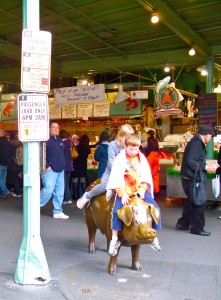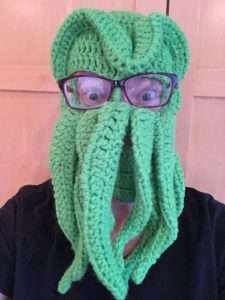
What makes Seattle particularly well suited to writing speculative fiction set in it?
Kat – Marvelously creepy weather, and distinct neighborhoods that preserve their history. What are ghosts but history that won’t go away?
Julie – The weather for sure, as well as the visual landscape it provides. The distinct neighborhoods with life. Any fiction set in a distinct city is better.
John – The diversity of culture and people as well as the landscape
K.C. – The geography and the weather, which can go from fog to crystal clear one day to the next.
What landmarks of Seattle lend themselves to spec-fic writing?
Kat – Pioneer Square. The first year I was here, an unusual fog struck and all I could see were the disembodied feet of pedestrians moving in it, which inspired all sorts of possibilities writing-wise. Seattle has lots of layers, which are great writing points, the places where the skeleton is partially exposed.
Julie – Seattle has lots of distinctive features. The Greenlake district is really distinctive, but there are lots of different settings that are suited to different moods.
John – The greenness of winter as well as the wilderness and the places to get lost that it provides
K.C. – The whimsical details of the city, such as the five foot concrete dragon in the park near me in West Seattle. I wrote my story, I Must to the Barber’s Chair, because of a sign I’d seen: “Psychic” in one window and “Barber” in the adjoining one. After the story was published, the barber who owned that shop wrote to me. He said the psychic had gone out of business (which you think they would have seen coming) and he’d been moved to buy the “Psychic” sign and add it to his own window.
What works other than your own are set in Seattle?
Cherie Priest’s Boneshaker and Dreadnought
Megan Lindholm’s Wizard of the Pigeons
Some of Louise Marley‘s works
Terry Brooks – Knight of the Word
And some set farther afield, most notably the Twilight series
How do you research Seattle-based stories?
Kat recommends Historylink.org, which has its own Twitter stream, as a resource.
Also the Museum of History and Industry.
Most participants like to go to places to research and get the ambience that affects a story.
K.C. believes in fussing with setting details, while John suggests fussing on a different level by researching names and cultural background. He strives for enough concrete details to make something authentic then makes up the rest, creating a veneer of research that doesn’t bog him down.
Kat: I’d like to be right all the time but the city keeps changing, like the Picnic Pavilion in Occidental Park, which got torn down after the book holding it was published.
Cat suggests one of the Seattle ghost tours, and recently did this one. Learned details like a place at Pike Place Market where three ley lines meet, and Dr. Linda Hazard, an early Seattle serial killer.
Details of Seattle that make it particularly well suited to the weird:
High number of serial killers
Lots of wildlife – cougars and bears
Fertility of the soil
Banana slugs and geoducks




 Thursday I will be at the SFWA board meeting. Huzzah! That evening I’m planning on swinging by the Chinese Science Fiction Party.
Thursday I will be at the SFWA board meeting. Huzzah! That evening I’m planning on swinging by the Chinese Science Fiction Party.


3 Responses
Thanks for posting this! I had to skip NorWesCon this year, and I now find myself trolling the web for mentions of the panels I would have attended had I been able to go. This is great! 🙂
You are quite welcome! It was a great panel and the room was jam-packed. We probably could have gone on a lot longer.